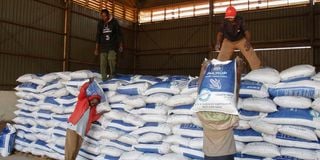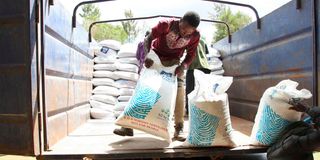Premium
Fishy money trail in Sh10bn Ruto fertiliser deal triggers probe

Workers arrange bags of subsidy fertilisers at the National Cereals and Produce Board depot in Elburgon, Nakuru County on February 16, 2023.
Suspicious transactions by one of the companies awarded multibillion-shilling tenders to supply subsidised fertiliser have sparked alarm among financial sector regulators, Nation has learnt.
Mashambani Farm Inputs Eldoret Ltd was awarded a Sh10.2 billion tender to supply fertiliser to the Kenya National Trading Corporation (KNTC), but regulators have since raised questions over the cash movements and documents presented to support some of the out-sized transactions.
From large and unexplained cash withdrawals after payments from KNTC to seemingly altered documents supporting big money transactions, the firm has caught the eye of agencies tasked with blocking the movement of illicit funds.
Sources at two financial sector regulators, who sought anonymity, separately told Nation the firm’s bank accounts were being monitored.
Our sources requested to remain anonymous as they are not allowed to speak to the press without express authority from the institutions’ top brass.
The Financial Reporting Centre, the agency that tracks illicit money, and the Central Bank of Kenya, which regulates the banking sector, are combing through the firm’s activities over the past three months.
The monitoring of the accounts is intended to confirm whether State officials colluded with the company’s directors to embezzle billions of taxpayers’ funds through the fertiliser subsidy programme.
President William Ruto initiated the subsidy programme as a long-term solution to fluctuating food prices that have dealt a financial blow to millions of households following one of the country’s worst drought spells in recent history, coupled with global challenges like the Russia-Ukraine war.
Kenya has over the years imported food produce such as wheat and agricultural inputs like fertilisers from the two warring countries. Their conflict has contributed to sharp increases in food prices. Mashambani Farm Inputs in January signed a contract with KNTC that will see it supply 112,700 metric tonnes of various fertilisers. KNTC is already selling some of the products to Kenyan farmers at subsidised prices.
The contract, a copy of which Nation has obtained, states that Mashambani will supply 20,200 tonnes of MiCrop planting (NPK blend), 24,500 tonnes of MiCrop top-dress and 68,000 tonnes of CAN. All three fertiliser types must be sourced from Yara, a Norwegian company listed on the Oslo Stock Exchange.
Yara had initially bagged a contract to supply KNTC with 112,700 tonnes of various fertilisers, but it has seemingly subcontracted Mashambani to do the job on its behalf.
Documents the KNTC filed at the National Assembly in preparation for the 2023/24 financial year revealed that the State corporation had contracted Yara to supply it with the agricultural input.
Another firm, ETG, also has a contract with KNTC for the supply of 130,000 tonnes of various fertiliser types. But Mashambani confirmed to Nation that it was subcontracted to supply Yara products to KNTC.
Barely three weeks after the contract was signed, Mashambani received part payment from KNTC. Shortly afterwards, the firm sent over Sh320 million to an individual identified as Mr Alfred Rono.
Anomaly
In declaration forms for the funds' transfer, Mashambani claimed the money was for the purchase of packaging bags. This is an anomaly, as the fertiliser comes already packaged. Going by the math in the declaration form, Mashambani may spend over Sh2 billion on packaging bags for the duration of its supply deal, raising questions as to why such a huge amount would be used on a redundant item.
When contacted, Mashambani proprietor George Kibet denied that the firm purchased packaging bags. He also denied that Mashambani is packaging fertilisers, saying, no local company has the capacity to package such an amount of fertiliser.

Workers offload bags of fertiliser at a National Cereals and Produce Board depot in Elburgon, Nakuru County. Suspicious transactions by one of the companies awarded multibillion-shilling tenders to supply subsidised fertiliser have sparked alarm among financial sector regulators.
“There is no single packaging company in Kenya that has the capacity of packaging the number of bags needed to supply farmers in the country with fertilisers. The best that exists can do maybe 20,000 packets in a day, for this case, we needed millions. That would have taken us at least two years to repackage,” he said.
The contract between KNTC and Mashambani says the former is to buy each 50kg bag of MiCrop planting fertiliser at Sh4,650. KNTC will also buy each bag of CAN and Microp top-dress fertiliser at Sh4,550.
When Nation called a Mashambani sales rep, the wholesale prices quoted were significantly higher than those KNTC negotiated for. Microp planting goes for Sh6,150 per 50kg bag. The representative quoted Sh5,400 per bag of Microp top-dressing and CAN.
Yara sells Microp planting at Sh5,250 per bag. Microp top dressing goes for Sh5,200 a bag, with CAN selling at Sh5,150. It is still unclear whether Yara and Mashambani will reconcile the actual wholesale price of the fertiliser supplied and the prices offered to KNTC.
There is no publicly available record indicating that KNTC floated a tender that led to Yara being selected as a supplier. While direct procurement is allowed in some instances, government institutions must inform the Public Procurement Regulatory Authority within 14 days if the goods or services have a value of over Sh500,000.
Our team contacted KNTC boss Pamela Mutua with queries on whether the price differences will somehow be bridged by the government and whether there was any procurement process in selecting Yara and Mashambani Farm Inputs for the lucrative supply deal.
Ms Mutua was yet to respond to our queries by the time of going to press.
KNTC is selling each bag of fertiliser for Sh3,500 under the government’s subsidy programme. The financial sector regulators have also been drawn to suspicious cash withdrawals by Mashambani officials soon after the KNTC payments.
In one batch of transactions, the officials withdrew close to Sh10 million in cash, citing in declaration forms that the money was for paying salaries. The move was a deviation from the company’s usual policy of paying salaries through bank transfers.
In another batch of withdrawals, the Mashambani bosses withdrew Sh2 million in Nairobi without sufficient explanation on bank declaration forms. After receiving funds from the KNTC, Mashambani Farm Inputs made several payments to different individuals and institutions, with invoices used to support the funds' transfers.
Several payments appear to have been supported using the same invoice. While the amounts paid changed in each document, the invoice number remained the same. This indicates that the same invoice may have been altered several times to justify the movement of funds.
In total, the amount with supporting invoices was Sh27 million. But Mashambani made payments of over Sh350 million to suppliers without supporting documents.
The contract between KNTC and Mashambani indicates that the state corporation is to buy fertiliser in batches of 28 tonnes each. Curiously, the document trail shows that Mashambani has already delivered 1900 tonnes of fertiliser.
This means, that the firm has made at least 67 deliveries of 28 tonnes each to KNTC in less than three months, a gargantuan task.
Reporting by Brian Wasuna, Adonijah Ndege, Steve Otieno and Dudley Muchiri





